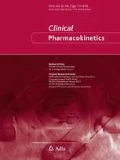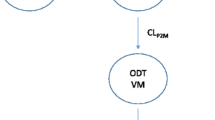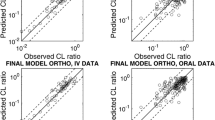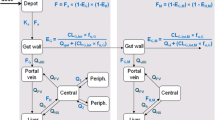Abstract
Maturation of drug systemic clearance mechanisms during the postnatal period produces dramatic and rapid changes in an infant’s capacity to eliminate drugs. A tentative general mathematical model describing the ontogeny of hepatic cytochrome P450 (CYP) enzyme-mediated clearance and renal clearance due to glomerular filtration in the first 6 months of life was elaborated from age-specific in vitro hepatic microsomal activity data (normalised to amount of hepatic mi-crosomal protein) for enzyme-specific probe substrates and in vivo probe substrate data for glomerular filtration (normalised to body weight), respectively. The model predicts an age- and clearance pathway-specific Infant Scaling Factor (ISF) for the first 6 months of life. The ISF reflects functional maturation of a specific clearance pathway (normalised to bodyweight) relative to adult values. Therefore, the ISF directly correlates adult clearance values with an infant’s capacity to eliminate drugs. Substitution of appropriate model parameter estimates and the age of the infant into the model provides an estimated ISF value, which may then be used to predict the contribution of a particular clearance pathway to total systemic clearance in the infant when adult systemic clearance values are known.
The model was tested for its ability to predict infant systemic clearance of drugs whose elimination is principally mediated by a single CYP enzyme or by glomerular filtration. The model performed reasonably well for CYP1A2 and C YP3 A4, but poorer predictions were obtained for CYP2D6 and CYP2C because of lack of model complexity and/or inadequate hepatic microsomal activity data to fully describe the maturational process of functional enzyme. For renal clearance due to glomerular filtration, data normalised to bodyweight (kg) showed a limited maturational trend, suggesting that adult renal clearances normalised to bodyweight might reasonably predict infant renal clearances in the first 6 months of life. The model provided reasonable predictions of renal clearance due to glomerular filtration in the infant.







Similar content being viewed by others
References
Alcorn J, McNamara PJ. Ontogeny of hepatic and renal systemic clearance pathways in infants: part I. Clin Phar-macokinet 2002; 41(12): 959–98
Eggermont JJ. Mathematical models for developmental changes. Acta Otolaryngol Suppl 1985; 421: 102–7
Houston JB. Utility of in vitro drug metabolism data in predicting in vivo metabolic clearance. Biochem Pharmacol 1994; 47(9): 1469–79
Hoener BA. Predicting the hepatic clearance of xenobiotics in humans from in vitro data. Biopharm Drug Dispos 1994; 15(4): 295–304
Ito K, Iwatsubo T, Kanamitsu S, et al. Quantitative prediction of in vivo drug clearance and drug interactions from in vitro data on metabolism, together with binding and transport. Annu Rev Pharmacol Toxicol 1998; 38: 461–99
Carlile DJ, Hakooz N, Bayliss MK, et al. Microsomal prediction of in vivo clearance of CYP2C9 substrates in humans. Br J Clin Pharmacol 1999; 47(6): 625–35
Obach RS. Prediction of human clearance of twenty-nine drugs from hepatic microsomal intrinsic clearance data: an examination of in vitro half-life approach and nonspecific binding to microsomes. Drug Metab Dispos 1999; 27(11): 1350–9
Obach RS, Baxter JG, Listen TE, et al. The prediction of human pharmacokinetic parameters from preclinical and in vitro metabolism data. J Pharmacol Exp Ther 1997; 283(1): 46–58
Iwatsubo T, Hirota N, Ooie T, et al. Prediction of in vivo drug metabolism in the human liver from in vitro metabolism data. Pharmacol Ther 1997; 73(2): 147–71
Lave T, Dupin S, Schmitt C, et al. Integration of in vitro data into allometric scaling to predict hepatic metabolic clearance in man: application to 10 extensively metabolized drugs. J Pharm Sci 1997; 86(5): 584–90
Thummel KE, Shen DD, Podoll TD, et al. use of midazolam as a human cytochrome P450 3A probe: I. In vitro-in vivo correlations in liver transplant patients. J Pharmacol Exp Ther 1994; 271(1): 549–56
Carlile DJ, Zomorodi K, Houston JB. Scaling factors to relate drug metabolic clearance in hepatic microsomes, isolated he-patocytes, and the intact liver: studies with induced livers involving diazepam. Drug Metab Dispos 1997; 25(8): 903–11
Kedderis GL. Extrapolation of in vitro enzyme induction data to humans in vivo. Chem Biol Interact 1997; 107(1-2): 109–21
Pang KS, Rowland M. Hepatic clearance of drugs: I. theoretical considerations of a well-stirred model and a parallel tube model. Influence of hepatic blood flow, plasma and blood cell binding, and the hepatocellular enzymatic activity on hepatic drug clearance. J PharmacokinetBiopharm 1977; 5(6): 625–53
Wilkinson GR, Shand DG. Commentary: a physiological approach to hepatic drug clearance. Clin Pharmacol Ther 1975; 18(4): 377–90
Hayton WL. Maturation and growth of renal function: dosing renally cleared drugs in children. AAPS Pharm Sci 2000; 2(1): art 3
Hayton WL, Kneer J, de Groot R, et al. Influence of maturation and growth on cefetamet pivoxil pharmacokinetics: rational dosing for infants [published erratum appears in Antimicrob Agents Chemother 1996 Jul; 40 (7): 1757]. Antimicrob Agents Chemother 1996; 40(3): 567–74
Chiba M, Nshime JA, Lin JH. In vitro metabolism of indinavir in the human fetal liver microsomes. Drug Metab Dispos 1997; 25(10): 1219–22
Vieira I, Sonnier M, Cresteil T. Developmental expression of CYP2E1 in the human liver: hypermethylation control of gene expression during the neonatal period. Eur J Biochem 1996; 238(2): 476–83
Short CR, Stith RD. Perinatal development of hepatic microsomal mixed function oxidase activity in swine. Biochem Pharmacol 1973; 22(11): 1309–19
von Moltke LL, Greenblatt DJ, Grassi JM, et al. Multiple human cytochromes contribute to biotransformation of dextro-methorphan in-vitro: role of CYP2C9, CYP2C19, CYP2D6, and CYP3A. J Pharm Pharmacol 1998; 50(9): 997–1004
Joly JG, Doyon C, Peasant Y. Cytochrome P-450 measurement in rat liver homogenate and microsomes: its use for correction of microsomal losses incurred by differential centrifugation. Drug Metab Dispos 1975; 3(6): 577–86
Zamboni L. Electron microscopic studies of blood embryogenesis in humans: I. the ultrastructure of the fetal liver. J Ultrastruct Res 1965; 12(5): 509–24
Ring JA, Ghabrial H, Ching MS, et al. Fetal hepatic drug elimination. Pharmacol Ther 1999; 84(3): 429–45
Coppoletta JM, Wolbach MD. Body length and organ weights of infants and children: a study of the body length and normal weights of the more important vital organs of the body between birth and twelve years of age. Am J Pathol 1933; 9: 55–70
Hamill PV, Drizd TA, Johnson CL, et al. Physical growth: National Center for Health Statistics percentiles. Am J Clin Nutr 1979; 32(3): 607–29
Fahey JT. Developmental aspects of hepatic blood flow. In: Suchy FJ, editor. Liver disease in children. St Louis (MO): Mosby-Year Book Inc, 1994: 31–8
Leevy C, Bender J, Silverberg M, et al. Physiology of dye extraction by the liver: comparative studies of sulfobromo-phthalein and indocyanine green. Ann N Y Acad Sci 1963; 111: 161–75
Lind J. Changes in the liver circulation at birth. Ann of NY Acad Sci 1963; 111: 110–20
Morselli PL, Franco-Morselli R, Bossi L. Clinical pharmacokinetics in newborns and infants: age-related differences and therapeutic implications. Clin Pharmacokinet 1980; 5(6): 485–527
Rubin M, Brack E, Rapoport M. Maturation of renal function in childhood: clearance studies. J Clin Invest 1949; 28: 1144–62
Colon A. Textbook of pediatric hepatology. 2nd ed. Chicago (IL): Year Book Medical Pub Inc, 1990
Pacifici GM, Viani A, Taddeucci-Branelli G, et al. Effects of development, aging, and renal and hepatic insufficiency as well as hemodialysis on the plasma concentrations of albumin and alpha 1-acid glycoprotein: implications for binding of drugs. Ther Drug Monit 1986; 8(3): 259–63
Kanakoudi F, Drossou V, Tzimouli V, et al. Serum concentrations of 10 acute-phase proteins in healthy term and preterm infants from birth to age 6 months. Clin Chem 1995; 41(4): 605–8
McNamara PJ, Alcom J. Protein binding predictions in infants [online]. AAPS PharmSci 2002; 4 (1): art. 4. Available from: http://www.aapspharmsci.org/scientificjournals/pharmsci/journal/040104.htm [accessed 2002 Aug 29]
Bertz RJ, Granneman GR. Use of in vitro and in vivo data to estimate the likelihood of metabolic pharmacokinetic interactions. Clin Pharmacokinet 1997; 32(3): 210–58
Falcao AC, Fernandez de Gatta MM, et al. Population pharmacokinetics of caffeine in premature neonates. Eur J Clin Pharmacol 1997; 52(3): 211–7
Anderson BJ, Gunn TR, Holford NH, et al. Caffeine overdose in a premature infant: clinical course and pharmacokinetics. Anaesth Intensive Care 1999; 27(3): 307–11
Pons G, Carrier O, Richard MO, et al. Developmental changes of caffeine elimination in infancy. Dev Pharmacol Ther 1988; 11(5): 258–64
Busto U, Bendayan R, Sellers EM. Clinical pharmacokinetics of non-opiate abused drugs. Clin Pharmacokinet 1989; 16(1): 1–26
Kandrotas RJ, Cranfield TL, Gal P, et al. Effect of phenobarbital administration on theophylline clearance in premature neonates. Ther Drag Monit 1990; 12(2): 139–43
Aranda JV, Sitar DS, Parsons WD, et al. Pharmacokinetic aspects of theophylline in premature newboms. N Engl J Med 1976; 295(8): 413–6
Ahn HW, Shin WG, Park KJ, et al. Pharmacokinetics of theophylline and caffeine after intravenous administration of aminophylline to premature neonates in Korea. Res Commun Mol Pathol Pharmacol 1999; 105(1-2): 105–13
Gilman JT, Gal P, Levine RS, et al. Factors influencing theophylline disposition in 179 newborns. Ther Drug Monit 1986; 8(1): 4–10
Latini R, Assael BM, Bonati M, et al. Kinetics and efficacy of theophylline in the treatment of apnea in the premature newborn. Eur J Clin Pharmacol 1978; 13(3): 203–7
Moore ES, Faix RG, Banagale RC, et al. The population pharmacokinetics of theophylline in neonates and young infants. J Pharmacokinet Biopharm 1989; 17(1): 47–66
Hilligoss DM, Jusko WJ, Koup JR, et al. Factors affecting theophylline pharmacokinetics in premature infants with apnea. Dev Pharmacol Ther 1980; 1(1): 6–15
Taburet AM, Schmit B. Pharmacokinetic optimisation of asthma treatment. Clin Pharmacokinet 1994; 26(5): 396–418
Brash AR, Hickey DE, Graham TP, et al. Pharmacokinetics of indomethacin in the neonate. Relation of plasma indomethacin levels to response of the ductus arteriosus. N Engl J Med 1981; 305(2): 67–72
Vert P, Bianchetti G, Marchal F, et al. Effectiveness and pharmacokinetics of indomethacin in premature newborns with patent ductus arteriosus. Eur J Clin Pharmacol 1980; 18(1): 83–8
Thalji AA, Carr I, Yeh TF, et al. Pharmacokinetics of intravenously administered indomethacin in premature infants. J Pediatr 1980; 97(6): 995–1000
Weninger M, Pollak A, Salzer-Muhar U, et al. Pharmacokinetics of intra-arterial indomethacin treatment for patent ductus arteriosus. Eur J Pediatr 1989; 149(2): 138–40
Oberbauer R, Krivanek P, Turnheim K. Pharmacokinetics of indomethacin in the elderly. Clin Pharmacokinet 1993; 24(5): 428–34
Jacqz-Aigrain E, Bellaich M, Faure C, et al. Pharmacokinetics of intravenous omeprazole in children. Eur J Clin Pharmacol 1994; 47(2): 181–5
Chang M, Tybring G, Dahl ML, et al. Interphenotype differences in disposition and effect on gastrin levels of omeprazole: suitability of omeprazole as a probe for CYP2C19. Br J Clin Pharmacol 1995; 39(5): 511–8
Ito S, Gow R, Verjee Z, et al. Intravenous and oral propafenone for treatment of tachycardia in infants and children: pharmacokinetics and clinical response. J Clin Pharmacol 1998; 38(6): 496–501
Bryson HM, Palmer KJ, Langtry HD, et al. Propafenone: a reappraisal of its pharmacology, pharmacokinetics and therapeutic use in cardiac arrhythmias. Drugs 1993; 45(1): 85–130
Wiest DB, Ohning BL, Garner SS. The disposition of alfentanil in neonates with respiratory distress. Pharmacotherapy 1991; 11(4): 308–11
Davis PJ, Killian A, Stiller RL, et al. Pharmacokinetics of alfentanil in newborn premature infants and older children. Dev Pharmacol Ther 1989; 13(1): 21–7
Bodenham A, Park GR. Alfentanil infusions in patients requiring intensive care. Clin Pharmacokinet 1988; 15(4): 216–26
de Repentigny L, Ratelle J, Leclerc JM, et al. Repeated-dose pharmacokinetics of an oral solution of itraconazole in infants and children. Antimicrob Agents Chemother 1998; 42(2): 404–8
Heykants J, Michiels M, Meuldermans W, et al. The pharmacokinetics of itraconazole in animals and man: an overview. In: Fromtling R, editor. Recent trends in the discovery, development and evaluation of antifungal agents. Barcelona: Prous Science Publisher, 1987
Lee TC, Charles BG, Harte GJ, et al. Population pharmacokinetic modeling in very premature infants receiving midazolam during mechanical ventilation: midazolam neonatal pharmacokinetics. Anesthesiology 1999; 90(2): 451–7
Burtin P, Jacqz-Aigrain E, Girard P, et al. Population pharmacokinetics of midazolam in neonates. Clin Pharmacol Ther 1994; 56(6 Pt 1): 615–25
Garzone PD, Kroboth PD. Pharmacokinetics of the newer benzodiazepines. Clin Pharmacokinet 1989; 16(6): 337–64
Gordjani N, Burghard R, Leititis JU, et al. Serum creatinine and creatinine clearance in healthy neonates and prematures during the first 10 days of life. Eur J Pediatr 1988; 148(2): 143–5
Haycock GB. Development of glomerular filtration and tubular sodium reabsorption in the human fetus and newborn. Br J Urol 1998; 81 Suppl. 2: 33–8
Guignard JP, Torrado A, Da Cunha O, et al. Glomerular filtration rate in the first three weeks of life. J Pediatr 1975; 87(2): 268–72
Oh W, Oh MA, Lind J. Renal function and blood volume in newborn infants related to placental transfusion. Acta Paediat Scand 1966; 55: 197–210
Aperia A, Broberger O, Elinder G, et al. Postnatal development of renal function in pre-term and full-term infants. Acta Paediatr Scand 1981; 70(2): 183–7
Stewart CF, Hampton EM. Effect of maturation on drug disposition in pediatric patients. Clin Pharm 1987; 6(7): 548–64
Vervelde ML, Rademaker CM, Krediet TG, et al. Population pharmacokinetics of gentamicin in preterm neonates: evaluation of a once-daily dosage regimen. Ther Drug Monit 1999; 21(5): 514–9
Sato Y. Pharmacokinetics of antibiotics in neonates. Acta Paediatr Jpn 1997; 39(1): 124–31
Pons G, d’Athis P, Rey E, et al. Gentamicin monitoring in neonates. Ther Drug Monit 1988; 10(4): 421–7
Matzke GR, Millikin SP, Kovarik JM. Variability in pharmacokinetic values for gentamicin, tobramycin, and netilmicin in patients with renal insufficiency. Clin Pharm 1989; 8(11): 800–6
Kildoo CW, Lin LM, Gabriel MH, et al. Vancomycin pharmacokinetics in infants: relationship to postconceptional age and serum creatinine. Dev Pharmacol Ther 1989; 14(2): 77–83
Asbury WH, Darsey EH, Rose WB, et al. Vancomycin pharmacokinetics in neonates and infants: a retrospective evaluation. Ann Pharmacother 1993; 27(4): 490–6
Rodvold KA, Everett JA, Pryka RD, et al. Pharmacokinetics and administration regimens of vancomycin in neonates, infants and children. Clin Pharmacokinet 1997; 33(1): 32–51
Hoie EB, Swigart SA, Leuschen MP, et al. Vancomycin pharmacokinetics in infants undergoing extracorporeal membrane oxygenation. Clin Pharm 1990; 9(9): 711–5
Grimsley C, Thomson AH. Pharmacokinetics and dose requirements of vancomycin in neonates. Arch Dis Child Fetal Neonatal Ed 1999;81(3):F221–7
Leader WG, Chandler MH, Castiglia M. Pharmacokinetic optimisation of vancomycin therapy. Clin Pharmacokinet 1995; 28(4): 327–42
Acknowledgements
Jane Alcorn was supported by the University of Kentucky Research Challenge Trust Fund. This work was supported in part by the National Institutes of Health grant HD37463.
Author information
Authors and Affiliations
Corresponding author
Rights and permissions
About this article
Cite this article
Alcorn, J., McNamara, P.J. Ontogeny of Hepatic and Renal Systemic Clearance Pathways in Infants: Part II. Clin Pharmacokinet 41, 1077–1094 (2002). https://doi.org/10.2165/00003088-200241130-00005
Published:
Issue Date:
DOI: https://doi.org/10.2165/00003088-200241130-00005




